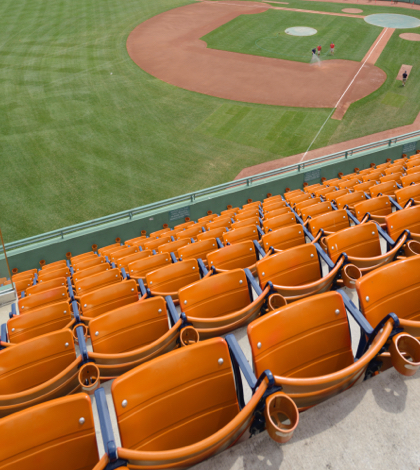A dispute regarding its stadium lease will cause the Single-A team, which has called Adelanto home since 1991, to be disbanded when this season ends. Some people in the High Desert aren’t happy about that.
Sometime this month, the High Desert Mavericks will play their last game at Heritage Field at Stater Bros. Stadium in Adelanto.
The team, a Single-A affiliate of the Texas Rangers, will cease operations at the end of this season, the result of a dispute regarding the ball club’s lease at the city-owned stadium, a dispute that both sides were unable to resolve.
In 2017, the California League will shrink from 10 to 8 teams – the Bakersfield Blaze, a Seattle Mariners affiliate, are also being shut down – and the players that make up both of those rosters will either move up, get released or end up with another organization.
The California League, which announced the end of both teams on Aug. 22, is scheduled to end its regular season on Labor Day. Because the Mavericks won the season’s first half, the team is guaranteed a spot in the California League playoffs, which will begin Wednesday.
After that, win or or lose, the High Desert will be without a professional baseball team for the first time in 25 years. That’s a major loss for the region, said a prominent member of the High Desert’s business community.
“It’s sad, and I feel very bad for the people who went to games and were devoted fans,” said Joe Brady, president of The Bradco Cos. in Victorville, one of the largest commercial real estate brokerages in the High Desert.
Brady, who has worked in the High Desert for more than 25 years, said he used to attend several Mavericks games every season, but said he hasn’t been to one in several years.
“We always had a good time whenever we went,” Brady said. “For a long time the team had had a good relationship with city, but that eroded. The worst part is that the Mavericks are the only professional sports team we have up here.”
The death of the Mavericks is more than the loss of baseball team, according to the franchise’s owner.
Adelanto broke a legal, binding contract when it terminated its lease with the team earlier this year, said Dave Heller, managing partner of Main Street California LLC, the Mavericks’ owner.
Because of that, no professional baseball team is likely to put one of its affiliates in the High Desert ever again, Heller believes.
“I think that this dispute has poisoned the High Desert market as far as minor league baseball is concerned,” Heller said. “Not just Adelanto, which will still have the stadium, but the whole market. If Apple Valley or Victorville were to say to a major league team ‘we’re going to build a state-of-the-art A-League stadium,’ I don’t think there’s a single franchise that would take them up on it.
“They’ve destroyed the entire market permanently, and that’s a shame.”
The Mavericks began playing in Adelanto in 1991, when the Riverside Red Wave, a San Diego Padres affiliate, moved into what was then called Mavericks Stadium.
During its first year playing in the Victor Valley, the Mavericks became the first California League team to attract more that 200,000 fans in one season. Five years later, the team attracted its one millionth fan.
Recently, the team has averaged about 3,000 season ticket holders per season, with an average attendance in 2016 of roughly 1,100 per home game, said Ben Hemmen, the Mavericks’ general manager.
Hemmen went through a similar ordeal six years ago, when he worked for the Omaha Royals – now the Storm Chasers – a Triple A affiliate of the Kansas City Royals.
“We shut down Rosenblatt Stadium, which was 62 years old,” Hemmen said of the ballpark probably best remembered for being the home of the College World Series. “That was very difficult, and so is this. The feedback we’re getting, especially from the business community, is that people are disappointed. It’s too bad, too, because this is still a good market for minor league baseball.”
The Mavericks played the 2016 season under a lease that began in 2012, an agreement that required the team to pay the city $1 a year for use of the stadium.
By the start of this year, Adelanto officials had found much not to like about their financial arrangement with the team. They maintained that the Mavericks owed the city $2 million for upkeep at Stater Bros. Stadium, and that the ball club unfairly limited the number of non-baseball events, like concert and football games, that were held there.
City officials negotiated a “bad lease” with Main Street California that needed to be reworked, Councilman Jermaine Wright said in January.
“I don’t know of any other minor league baseball team that pays $1 a year to lease its stadium,” Wright said at the time. “That’s unheard of.”
A series of meetings between team and city officials did not produce a resolution. Wright predicted that the disagreement could lead to the Mavericks – which has won three California League championships during its time in the High Desert – ultimately being forced out of the stadium.
Because the dispute has yet to be decided – it’s expected to go before an arbitrator, though no date has been set – Adelanto officials are not talking to the media.
Heller, however, doesn’t have that restriction, and he doesn’t mince words.
“I never would have imagined that the city would tear up a lease, a legal [contract] that it negotiated and agreed to,” Heller said. “I’ve also never heard of a stadium making more money after the baseball team leaves. That doesn’t happen.”
Even though the Mavericks’ attendance dipped slightly in recent years, the team did build up a loyal fan base that will miss its summer evenings at Stater Bros. Stadium, said Brad Letner, president and chief executive officer of the Hesperia Chamber of Commerce.
“I think there’s a little sadness that the team isn’t going to be playing here anymore,” Letner said. “I would go to games and see some of the same people every time, the season ticket holders, and I feel their loss. But the city made a business decision. It decided that, from a cost-benefit standpoint, its lease with the team didn’t work out.”
Heller’s bleak assessment of any Victor Valley city getting a minor league baseball team in the future might end up being accurate, Brady said.
“I think the land the stadium is on is probably more valuable than the stadium,” said Brady, who once tried unsuccessfully to negotiate a sale of Stater Bros. Stadium on behalf of the city. “I wouldn’t be surprised to see [the stadium removed] and something developed there.”
 IE Business Daily Business news for the Inland Empire.
IE Business Daily Business news for the Inland Empire.


